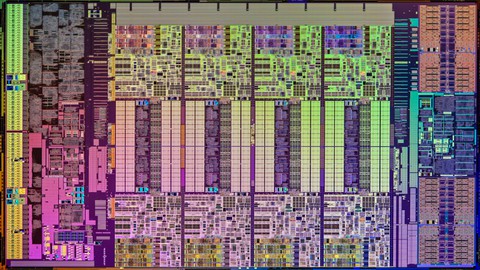
Applied Computer Architectures
Applied Computer Architectures, available at $19.99, has an average rating of 3.85, with 61 lectures, based on 19 reviews, and has 81 subscribers.
You will learn about Computer Architecture This course is ideal for individuals who are Electrical Engineering students or FPGA Enthousiasts It is particularly useful for Electrical Engineering students or FPGA Enthousiasts.
Enroll now: Applied Computer Architectures
Summary
Title: Applied Computer Architectures
Price: $19.99
Average Rating: 3.85
Number of Lectures: 61
Number of Published Lectures: 61
Number of Curriculum Items: 61
Number of Published Curriculum Objects: 61
Original Price: $94.99
Quality Status: approved
Status: Live
What You Will Learn
- Computer Architecture
Who Should Attend
- Electrical Engineering students
- FPGA Enthousiasts
Target Audiences
- Electrical Engineering students
- FPGA Enthousiasts
This class will cover the Topics of Computer Architecture: Basic Processor Architecture, the Memory Hierarchy, Pipelining, Virtual Memory, Superscalar Processors (ie Out of Order Processors), Vector Architectures and Parallel Computing Architectures. The Last Part of the Class is about the Architecture Design Process and How to Design your own Architecture for a given application.
Course Curriculum
Chapter 1: Processor Architecture Basics
Lecture 1: Introduction
Lecture 2: Von Neumann Versus Harvard Architecture
Lecture 3: The MIPS 32 Architecture
Lecture 4: Instructions Encoding
Lecture 5: The 8086 Processor
Lecture 6: The i386 Processor
Chapter 2: The Memory Architecture
Lecture 1: Spatial Temporal Locality
Lecture 2: The Memory Hierarchy
Lecture 3: Memory Technology
Lecture 4: Cache Memory
Lecture 5: Cache Misses & Hits
Lecture 6: Write Procedures
Lecture 7: Replacement Policy
Lecture 8: Replacement Policy Statistics
Lecture 9: Cache Coherence: Snoop Logic
Lecture 10: Cache Performance
Chapter 3: Pipelining
Lecture 1: Why Pipelining?
Lecture 2: The MIPS Pipeline
Lecture 3: Pipeline Speedup
Lecture 4: Pipelining Hazard Types
Lecture 5: Structural Hazards
Lecture 6: Data Hazards
Lecture 7: Control Hazards & Speculative Execution
Lecture 8: Branch Predictors
Lecture 9: Exceptions and Interrupts
Lecture 10: Exceptions in the MIPS Pipeline
Lecture 11: MIPS Architecture with Hazards Detection
Chapter 4: Superscalar Processors
Lecture 1: Introduction
Lecture 2: What are Out of Order Pipelines?
Lecture 3: Instruction Level Parallelism
Lecture 4: ILP Analysis
Lecture 5: True and False Data Dependencies
Lecture 6: Register Renaming: Why and How ?
Lecture 7: Dynamic Scheduling
Lecture 8: Dispatch and Issue
Lecture 9: Issue Policies
Lecture 10: The Reorder Buffer
Lecture 11: In Order Commit
Lecture 12: Reorder Buffer Extensions for Exceptions
Lecture 13: Branch Misprediction in Pipeline Recovery
Chapter 5: Virtual Memory Management
Lecture 1: Introduction
Lecture 2: What is Virtual memory and why use it ?
Lecture 3: Function of a Page Table
Lecture 4: Page Table Architecture
Lecture 5: Memory Address Calculation
Lecture 6: Multilevel Page Table
Lecture 7: Replacement and Writes
Lecture 8: TLB Cache
Lecture 9: TLB and Cache Interaction
Chapter 6: Parallel Processor Architecture
Lecture 1: Introduction
Lecture 2: MMX Instructions
Lecture 3: Vector Processors
Lecture 4: Vector Instruction Set
Lecture 5: Masked Vector Instructions
Lecture 6: Vector Memory Operations
Lecture 7: Multithreading
Chapter 7: Algorithms and Architecture Design
Lecture 1: Introduction
Lecture 2: The Flexibility Efficiency Trade Off
Lecture 3: Is my Algorithm Suitable for a VLSI Architecture?
Lecture 4: Assembling General Purpose and Dedicated VLSI Architectures
Lecture 5: Designing Dedicated VLSI Architectures
Instructors
-
Lucas Mayrhofer
Computer scientist and Teacher
Rating Distribution
- 1 stars: 3 votes
- 2 stars: 2 votes
- 3 stars: 3 votes
- 4 stars: 2 votes
- 5 stars: 9 votes
Frequently Asked Questions
How long do I have access to the course materials?
You can view and review the lecture materials indefinitely, like an on-demand channel.
Can I take my courses with me wherever I go?
Definitely! If you have an internet connection, courses on Udemy are available on any device at any time. If you don’t have an internet connection, some instructors also let their students download course lectures. That’s up to the instructor though, so make sure you get on their good side!
You may also like
- Best Video Editing Courses to Learn in March 2025
- Best Music Production Courses to Learn in March 2025
- Best Animation Courses to Learn in March 2025
- Best Digital Illustration Courses to Learn in March 2025
- Best Renewable Energy Courses to Learn in March 2025
- Best Sustainable Living Courses to Learn in March 2025
- Best Ethical AI Courses to Learn in March 2025
- Best Cybersecurity Fundamentals Courses to Learn in March 2025
- Best Smart Home Technology Courses to Learn in March 2025
- Best Holistic Health Courses to Learn in March 2025
- Best Nutrition And Diet Planning Courses to Learn in March 2025
- Best Yoga Instruction Courses to Learn in March 2025
- Best Stress Management Courses to Learn in March 2025
- Best Mindfulness Meditation Courses to Learn in March 2025
- Best Life Coaching Courses to Learn in March 2025
- Best Career Development Courses to Learn in March 2025
- Best Relationship Building Courses to Learn in March 2025
- Best Parenting Skills Courses to Learn in March 2025
- Best Home Improvement Courses to Learn in March 2025
- Best Gardening Courses to Learn in March 2025






















